- Home
- Upton Sinclair
Presidential Agent Page 27
Presidential Agent Read online
Page 27
“I was secretary of a labor union for a while—a Socialist union, to be sure.”
“We can leave off the Pink label. You were the secretary of a union, and you employed Ludi Schultz as a commercial artist, and in his studio you met his wife. Now you’ve learned from refugees in Paris where she is and came to me to ask financial support. I explained to you my father’s position and my own; I will put up the money, but only on condition that my name is never to be mentioned by anyone. I introduce you to Hofman and you persuade him to help you. You don’t tell him that I am going to be in the château. You are a German, and you have a confederate who has a job there. All that I’m doing is putting up a bunch of money. You can tell Hofman I’ll pay him anything within reason for the job.”
“You will confirm that?”
“Of course. But I think the proposal ought to come from you, because you are the one who has dug up the case and has got all steamed up about it. You present it emotionally, as a friend of Trudi’s, while I’m interested only because I consider her a great artist. You know how it is with us rich people—we let others do the dirty work.”
The ex-sailor and soldier didn’t smile often, but this humor was in accord with Marxist ideology, and he answered, in American: “You said it!”
V
The Capitán went over the story a second time, looking for flaws, and finally he said that he was willing to work over it and see how it developed—even to the extent of attending a spiritualist séance for Trudi’s sake! Lanny gave him a sum of money and said: “Get yourself a better suit and a room in a hotel. I’ll let Hofman bring Madame to you, because he has learned how to conduct these affairs, and Tecumseh is inclined to waste time in discussions with me.” Lanny could read the mind of a hard-boiled “monist,” hearing a phrase like that; he added: “Take it as a game, and play it according to the rules.”
“All right,” said the other. “Tell them.”
Lanny set forth the proper way to treat Madame and her “control.” Nothing of any importance might happen, and in that case it would be tedious, and seem very silly. “Whatever happens, do me the honor to believe that I haven’t said one word to the old woman about you, and I shall not. What name will you take?”
“Any you say.”
“All right, you are Monsieur Branting. I’ll tell Hofman you are a man I met in Berlin many years ago; you want to make a test, and for that reason I am telling him no more about you. You will take my word for that?”
“Yes, surely, Genosse Budd.”
“Don’t let that slip past your tongue again. Better call me Lanny. When the séance is over, call a taxi and send Madame to a picture show—that is her greatest joy in life—and you get acquainted with Hofman and tell him whatever you feel the circumstances warrant. Take him out to dinner and get him feeling good. From now on you are the boss!”
So they had a séance, and Tecumseh said there was that old man with the guns going off all around him. The old man said he was lonely and still couldn’t find his wife. He said he was trying not to worry about all that gold being lost, for after all, when had gold ever made anybody happy? That didn’t sound like Zaharoff, but maybe he was becoming spiritualized. Tecumseh remarked: “His gold is sour grapes”—which gave the impression that the stone-age man was becoming sophisticated. Tecumseh had never liked Sir Basil, and when he took his departure the chieftain said: “Boom, boom, boom—twenty-one guns!”
Next there was reported a little girl with blond hair in pigtails, speaking to someone she called “Pay-tah.” That gave Monck a jolt, for it had been his childhood nickname; he had been christened Peter. He had had a little sister who had died young and whom he barely remembered. Now she said that she was happy in the spirit world, and kept her love for him. This wasn’t exactly evidential, but the name was unusual, and Monck couldn’t figure out how anybody in this company could have heard it.
He was hoping for more news from home; but, alas, here came the insufferable Claribel, bouncing and eager to display her poetical talents. She asked for a name, and Monck took a chance and said “Ludi.” Evidently she thought he was speaking Latin, for she started on one of her visions, having to do with gladiators marching into an arena and ending with the lament that “Men can still find no pleasure so great as killing their fellowmen.” She asked for more, and Monck tried her first with a German word and then a Spanish. She was equal to both, and perhaps would have understood Tagalog or Marathi if his travels had taken him that far. When the tiresome séance was over, Hofman remarked: “Madame will have to be hypnotized again.”
VI
Having the locksmith alone in his hotel room, Monck poured out the sad story of a young woman artist of talent which had attracted the attention of experts even in France, and whose only offense had been refusing to accept the dictates of the Nazi tyrants and continuing to circulate exposures of their cruelty. The Nazis had caught her husband, and for four or five years nothing had been heard of him; no doubt he had been murdered and buried in quicklime. The widow had gone on with her activities, first in Berlin and then in Paris. Monck had got some of her literature from friends of the underground, and he gave it to Hofman to read; the highest and purest idealism, he said; a defense of the basic rights of freedom of speech and of religion which everyone in America took for granted.
The Nazi gangsters had kidnaped this woman, and were holding her somewhere under the Château de Belcour. They would torture her to make her reveal the names of her associates, and if she refused, they would never let up till they had killed her. Several refugees in Paris had disappeared, and everyone was satisfied that this was what had become of them; one of the Nazi spies among the refugees had confessed it.
Horace Hofman simply couldn’t believe such a tale. He thought he was living in a civilized world, and such things happened only in movies. Why didn’t the refugees appeal to the Paris police? Monck proceeded to set forth a still more melodramatic situation: the chief of the Paris police was a Fascist, at present engaged in a conspiracy to overthrow his own government, and permitting the enemies of his country to accumulate stores of arms for that purpose. The government, the army and navy and air force of France were riddled with such disloyalty, and anyone who went to the police on such an errand as Hofman suggested ran a risk of being himself locked up. Certainly someone in authority would give the Nazis a tip, and their victim would be whisked into Germany overnight.
Persuading an ordinary American to believe things like that was a long job of education. Monck had to tell how Göring and his followers had set fire to the Reichstag building in order to blame it on the Communists and justify their campaign of terrorism. He had to tell about the “Blood Purge” and what that meant—that Hitler, who had got power as a radical agitator and then had sold out to the big steel and munitions interests of his country, had murdered in cold blood some twelve hundred of his own followers who had tried to stick to their old program. He had to tell how the Nazis had killed the premiers of Austria and Rumania who had opposed them; likewise the king of Yugoslavia and the foreign minister of France. Hofman had read about these events, but had hardly realized their significance and had already forgotten them. America was such a well-behaved land, and so far off!
When the locksmith asked what they wanted of him, Monck pledged him to secrecy, and told him that he and other members of the underground were attempting to get Trudi out of the château. They had got an agent inside the place who would keep the dogs out of the way and leave one of the windows unfastened. What they wanted of Hofman was to come along and open the doors of whatever dungeons or lockups might be found in the cellars of the building.
“Just as simple as that!” said the Meister-Schlosser, with a smile. “It sometimes takes a lot of time to open a lock that one is not familiar with; it takes tools, some of which it is a near-crime to possess.”
“You have them,” replied Monck, “and we will carry them in for you and carry them out again.”
“And suppose we a
re caught and these amiable Nazis give us a dose of their torture?”
“Me, yes—but you, no. You are an American, and the last thing they want at this stage is any unfavorable publicity in your country. Our friends will be on watch outside, and if we fail to come out by a certain hour they will go to the American embassy, and more important yet, to the American newspapermen. We have the money to pay a first-class French avocat, and of course to pay you.”
“I would never think of taking money for anything of this sort. If I did it, it would be because I believe in fair play and decency. I have been asked to commit crimes more than once in my life, and if I did this it would be the first.”
“Strictly speaking, it is burglary; but we will go unarmed, and will be acting against kidnapers, who can hardly come into court with clean hands.”
“Suppose we opened the doors and found nobody inside, and then we were caught—what then?”
“We would have to produce the evidence we have of various persons who have disappeared in Paris, and what the Nazis have been doing at the château. They would find out what we had on them, and would have to back down; they aren’t ready for war, and they don’t want to be exposed until that time. I point out that you would be with us in those cellars and could make quite sure that we didn’t take anything but Trudi, or some other person we might find being held by force.”
VII
The locksmith said he’d have to have time to think this over; and what he did was to come straight to Lanny. “Mr. Budd, I have never in my life let myself be played for a sucker, and if you wish me to have anything to do with this enterprise you will have to deal with me openly. It is one thing if it is supported by a man of property and standing like yourself, and quite another if it is the proposal of a mysterious German who calls himself a ‘labor union secretary’ and who I suspect is going under a false name. Just what do you know about him?”
“I know him to be a man of good faith, whom I have tested and trust to the limit.”
“You believe this Trudi story?”
“I used to know Trudi well, and I did what I could to make her known as an artist of rare talent. You may recall that I mentioned her to you on the steamer. I haven’t the slightest doubt that Branting’s statements are true.”
“This is a serious matter for a man of my calling, Mr. Budd. Such a blunder could ruin me forever. You will have to trust me as I trust you. Are you backing this enterprise?”
“I am backing it to the limit. I cannot come forward myself, because of my father’s position and my own business in Germany; but I feel it my duty to help a woman of noble character, of sensitiveness and refinement, who has been made the victim of an outrage. Let me show you her work, which speaks for itself and for her.”
Lanny brought out a portfolio of photographs. “I have the originals of these in my storeroom at Juan. Most of them are sketches which Trudi would throw off in a few minutes. She loved to draw children and poor old men and women she saw in the street; she would watch them and then draw them from memory. She has extraordinary fineness and clarity of line, and you see that whether it is pencil or crayon, every stroke counts.”
Lanny was launched upon one of his persuasive discourses on art. He dealt with technical matters, but in simple language which an uninstructed hearer could follow. “There is a soul in these drawings,” he said. “Hardly one of them is commonplace; each gives you a feeling—weariness or gaiety, sorrow, hunger, despair. When you have looked at them for a while, you begin to know the person who has created or interpreted them; for no artist can make you feel such things unless he himself has felt them. These minute variations of a line do not happen by accident, but because someone has learned exactly what are the indications of a certain emotional state, and how to reproduce them on a small flat surface.”
Horace Hofman’s life had been lived in other fields than those of art; but he had had to do with fine distinctions and possessed a pair of keen eyes. After he had spent an hour studying these drawings, Trudi Schultz had become a real person, a living presence in the room. He said: “Mr. Budd, this is a dangerous undertaking, and I may be acting foolishly, but I am willing to help you if you can show me any chance of success. Of course I count upon you, in case we should get into trouble, to pay whatever it might cost to defend us.”
Said Lanny: “Every dollar I have in the world would be committed to your defense, and if necessary I would borrow from my father. You say that you will not let me pay you, but I assure you that if you do us this service, I will find some way to reward you, and on a liberal scale.”
VIII
While these things were going on, Beauty Budd was living at the hotel, having the time of her life, as she always did. She had spent some forty years making friends in Paris, and now they invited her, and she went tirelessly day and night. She had married a “spiritual” man and was quite sure that he had ennobled and reformed her, but somehow that didn’t keep her from believing that the grand monde was just as great and the haut monde just as high as it considered itself. She wanted Lanny to take her about, for he was a charming escort, and when she saw his success with important people she was ready to burst with pride—her corsage being already dangerously tight. Lanny went with her now and then, for that was the way to pick up information as to what was going on; you met the right people, said the right things to them, and guided the conversation into the channels you desired.
At an extremely classy soirée he ran into the American ambassador, that same “Bill” Bullitt who had been on the American staff at the Peace Conference, and whom Lanny had joined in protest against what they considered unsatisfactory provisions of the settlement. What a lot of water had flowed under the bridge in eighteen years! “Bill” had been ambassador to Russia, where he had acquired an intense dislike for the regime. Now he had got himself transferred to Paris, where he spoke boldly in opposition to the alliance of France with Russia, at the same time being troubled to discover in what company this brought him. William Christian Bullitt, amiable rich playboy like Lanny himself, had written in his youth a novel poking fun at the solemn snobbery of his native city of Philadelphia. Now he was round-faced and tending to baldness, serious and exactly proper in his evening clothes. He had been one of the original New Dealers, and rumor had it that he sometimes wrote speeches for the President. Lanny might have caused a sensation if he had said: “I wrote the Chicago quarantine speech”; but of course he wouldn’t.
He thought quickly, and remarked: “You know, Bill, you are likely to have a new French government to deal with before long.”
“You mean Blum again?” inquired the ambassador, ready to talk politics, and thinking that Lanny might have inside information.
“Nothing like that,” replied the art expert. “I mean the Cagoulards.”
“Oh, my God! You don’t mean you take those people seriously!”
“I wish I were at liberty to tell you what I know about their military preparations.”
The rest of the fashionable company was forgotten, and Bullitt drew the younger man out onto the terrace. It happened to be a warm evening, though late in the autumn, and they found two chairs. “Listen, old man,” said the ambassador. “I am the one person who has a right to know about such matters.”
“You must have heard about the plot already.”
“People talk to you much more freely than they do to one in my position. Tell me what you have heard.”
“It happens that my sources are confidential. You know my father’s position, and perhaps you know who my friends are.”
“You may count absolutely upon my discretion. I won’t breathe your name to a living soul.”
“Not even in your dispatches?”
“Of course not. Washington doesn’t ask how I know. They are satisfied if I tell them that I do.”
Lanny explained: “I can’t afford to take sides in these civil wars, because I have business connections in the different countries, and so has my father. But we are America
ns, and you really ought to know what is in the wind right now.”
So the son of Budd-Erling whispered the news about the arms caches, and the financiers who were backing the enterprise, and the Nazi agents who were pouring in funds. It wouldn’t be more than a month before the coup would come off and, in the Hitler phrase, “heads would begin to roll.” Bullitt asked many questions, and Lanny chuckled within himself, feeling certain that before the ambassador went to bed that night he would get off a coded dispatch to the State Department, or perhaps to the President direct. F.D. would read it, and know that Lanny Budd had got there first, and so Lanny would be the fair-haired boy!
He had more serious purposes in this bit of play. One good turn deserves another, and in the event that Horace Hofman got into trouble Lanny would be in position to ask favors; also, he wanted to find out what Bullitt knew concerning the Château de Belcour. He said: “I don’t know whether it’s Kurt Meissner or Graf Herzenberg who is distributing most of the money. I understand one is working for the Wehrmacht and the other for the Schutzstaffel.”
“All their agents are stuffed with funds,” declared the ambassador. “I wish we had one-tenth the amount for our work.”
Lanny asked what he knew about Herzenberg, and the other talked freely. The Graf was one of the early Nazis, and had a strong position in the party, since not many of the aristocracy had come into the movement in those days. Their fellow-aristocrats had rather looked down upon them, considering that there must be something cracked or crooked about persons who really took the Hitler ideas seriously. Now the Junkers had made terms with the Nazis, and were using them, or trying to, but they still looked down their long noses at them and counted the days before they could get rid of this bunch of upstarts and interlopers. Lanny knew all that, but didn’t say so; he listened and learned that Herzenberg was a sort of overseer of the German ambassador, like the commissars whom the Russians set to watch their army officers. At the same time he could do the dirty work that it was too dangerous for Embassy officials to do. He had as his mistress a redheaded Austrian actress who was reputed to have some Jewish blood and who very certainly was a spy working in French government circles for Nazi pay.

 Prince Hagen
Prince Hagen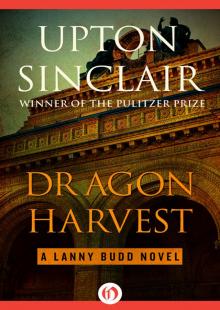 Dragon Harvest
Dragon Harvest The Jungle
The Jungle Sylvia's Marriage
Sylvia's Marriage Oil! A Novel by Upton Sinclair
Oil! A Novel by Upton Sinclair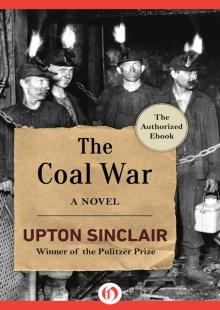 The Coal War: A Novel
The Coal War: A Novel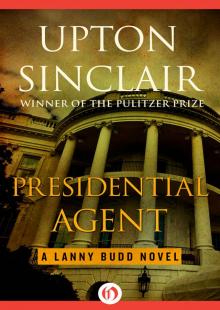 Presidential Agent
Presidential Agent World's End
World's End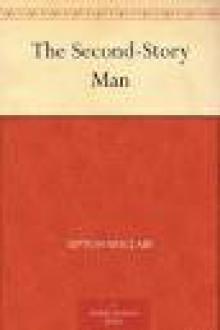 The Second-Story Man
The Second-Story Man O Shepherd, Speak!
O Shepherd, Speak!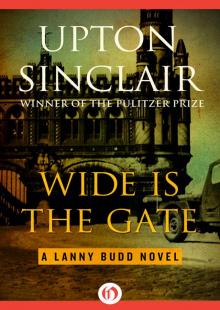 Wide Is the Gate
Wide Is the Gate The Return of Lanny Budd
The Return of Lanny Budd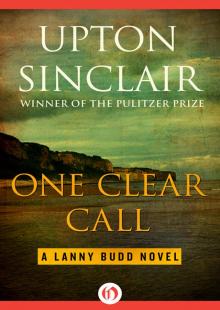 One Clear Call I
One Clear Call I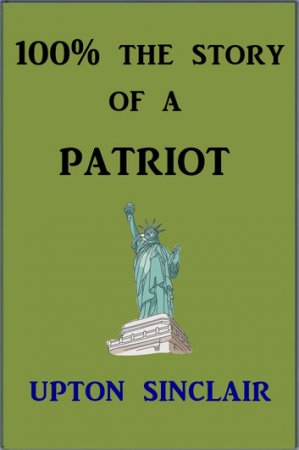 100%: the Story of a Patriot
100%: the Story of a Patriot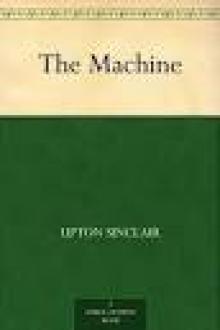 The Machine
The Machine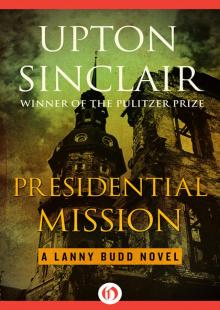 Presidential Mission
Presidential Mission A Cadet's Honor: Mark Mallory's Heroism
A Cadet's Honor: Mark Mallory's Heroism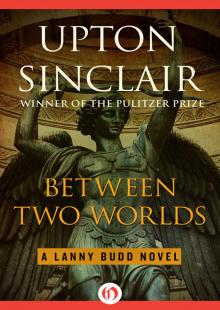 Between Two Worlds
Between Two Worlds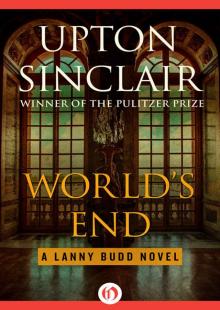 World's End (The Lanny Budd Novels)
World's End (The Lanny Budd Novels)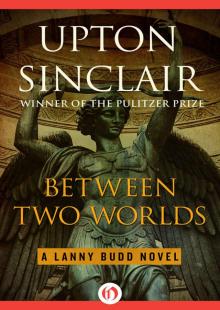 Between Two Worlds (The Lanny Budd Novels)
Between Two Worlds (The Lanny Budd Novels)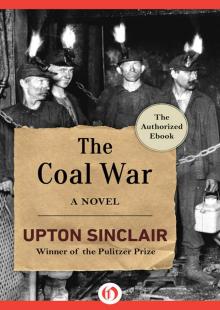 The Coal War
The Coal War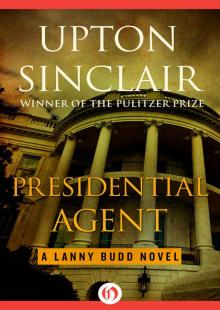 Presidential Agent (The Lanny Budd Novels)
Presidential Agent (The Lanny Budd Novels) Oil (filmed as There Will Be Blood)
Oil (filmed as There Will Be Blood)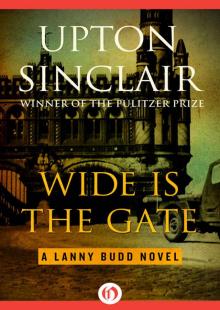 Wide Is the Gate (The Lanny Budd Novels)
Wide Is the Gate (The Lanny Budd Novels)